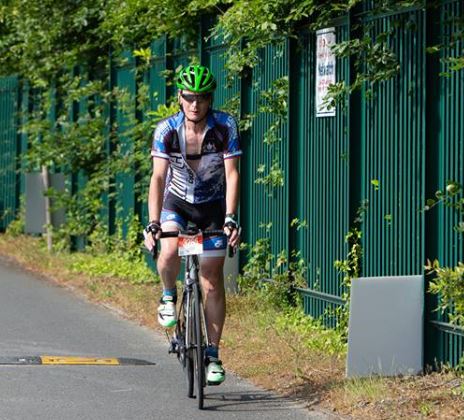Ireland in the 1970’s and 1980’s was a much different place to the Ireland of today. In my opinion, it was a better Ireland and I’ve often written about the things we did as we grew up.
People born in the countryside could use quite possibly one of the most lethal machines ever created, a chainsaw, at 12 years of age, for example. I knocked down my first tree at about age 14.
You honed your bike handling skills by falling off and remembering the hard way, not to make the same mistake again.
(I still have a wry smile how the modern “health and safety internet police” feel “shocked” when they see a cyclist racing a tractor. We were chasing tractors 40 years ago and to this day, the sound of an approaching tractor is still too hard to resist. An approaching tractor causes an unexplainable force, where your finger is immediately drawn to your right STI lever. You drop the chain onto a lower sprocket, match the tractor’s speed, get into the slipstream and the chase is on. It’s an art, learned almost a half century ago.)
In the countryside, if you didn’t have a bike, you had nothing. Parents always knew where children were, as a pile of bikes somewhere, (quite literally) was a giveaway. Internet chat rooms or game lobby’s were still the work of fiction.
We played Cowboys and Indians; we recreated the battle of the Somme. Everybody had a replica gun and if you didn’t have one, you made one. The PC brigade hadn’t been invented yet.
As children, we went out in the morning, came in for a while at lunch time, disappeared again, came back for dinner and got a few more hours exploring done before bed. We climbed trees without harnesses, without hi-viz jackets and without safety nets. The health and safety people would have had a coronary if they had been around in those days.
There were fights, punches were thrown and there were fallouts. There were children that excelled on the field of sport and some children had a singing voice. There was no “You’re a star” television nonsense; we were too busy to be thinking of becoming famous.
Our parents worked and worked bloody hard. My dad was a truck driver and my mam worked in a local business. They worked long hours and thanks to their hard work, as we often said in later years, “Santa always came”.
As children, we learned life skills such as like lighting the fire, putting on the dinner, using a Hoover, cutting lawns, operating a twin tub washing machine, ironing a shirt (one skill I never quite mastered). At weekends during the summer, we cut turf at the bog, as oil fired central heating was a long way off. “Stop complaining, you’ll toast your arse to it for the winter” we were regularly reminded.
Without good neighbours, you had nothing. When the turf was brought home, all the neighbours helped to take it in. In turn, their day came when people repaid the compliment. How many children ran down to the neighbour’s house to get a packet of biscuits or a jug of milk when visitors arrived unexpectedly and there was “nothing in the house”? Many neighbours had the loan of a fiver until payday and if it took an extra few days, it didn’t matter. “Sure, you’re hardly leaving the country are you” was the reply when people explained that they may not be able to repay it as soon as they had planned.
This week, we saw photographs of children sleeping in a Garda station. Their mother, for reasons best known to herself, saw it as her only option. The online police were onto it in a flash. “Sure she’s only a knacker” they screamed, as their hateful spite emerged. “Should be ashamed of herself” they bleated. Some people, I kid you not, wrote up charts and excel spreadsheets of the amount of money the children’s mother makes in “handouts” every week. Quick question here, how do they know all this stuff? How many people know what I earn every week or month, that’s my business, nobody else’s. By the way, the Minister for housing, tasked with addressing problems like this, is on his holidays.
Some time ago, I wrote an article here about a local radio programme I listened to. A mother was in a hospital with her 14 year old child, who has physiological problems and is on 24hr watch. Vital services were closing for the weekend, so the mother had to do what mothers do and would sit with her child for the weekend. That same day, our Taoiseach (Prime Minister) arrived in our town, wearing designer sunglasses and the “great and the good” were out to declare their unwavering devotion. The lady sat with her child, unaware of the “celebrations” being held a few short miles away. Our health system hasn’t quite lived up to its expectations for families like hers.
Over the last few years, I have lost touch with many people, as live evolves. I was shocked yesterday, to hear that a person I hold in huge regard took his life a few months ago. I refused to believe it, until a friend confirmed it today. I have to build up the courage to phone his dad to pass on my condolences, a hard call to make. A wonderful person and one of the good guys, I am so saddened that he saw this as a way out from his pain.
I read quite possibly the greatest internet comment ever last week. A person wrote the following or similar:
“Imagine the outcry, if the bailout had been for the poor” he wrote.
I can’t get those words, from that person I’ve never met, out of my mind, because they are so true and so powerful.
Irish people travelled all over the world and built most of it. They were accepted everywhere they went and were damn glad of Great Britain, Australia and the USA. Many a few pound was sent home to “keep the wolves from the door”.
As human beings drown in the Mediterranean Sea, we now refer to them as “migrants”. As they flee persecution, death and horror most people would struggle to comprehend, we see them as a threat for some reason. Nightly videos emerge of alleged “migrants” flooding Europe, intent on our destruction. As I write, there is still no evidence to support the claims.
My grandparents told me stories of how hard they worked. My grand dad cut turf in the above mentioned bog, as his job with Waterford County Council. He cycled to work, through some of the steepest hills in the country. For the record, his bike didn’t have a carbon fibre frame or Di2 Dura Ace gearing.
They told me of how Ireland coped during the Second World War and during the war of independence here at home. They told me of the resistance Irish people showed to the Black and Tans and how you helped your neighbour and friends.
Our affluent society has given rise to an Irish person and a society that I don’t like anymore. We live in a time where people are more interested in phoning a confidential phone number to report their neighbour for breaking a phoney hose pipe ban. Would the same people knock on their neighbour’s door and ask their neighbour if all is okay I wonder?
I wonder will today’s children get to the stage where they can write about their childhood like I do. Sleeping on a hard chair at a Garda station, won’t make easy reading, that’s for sure.
Will children write about how their mother was ostracised and shunned by sociely, because she brought them up alone. Not too long ago, those little children would have been taken from her arms by a sickening collusion between church and state. Some of those children would end up in homes of wealthy American families, the unlucky children would live in fear, cast aside in institutions. Some of the dinosaurs from that time still live among us, I’m sorry to say.
Hopefully, countries and people that are affected by western influence and horrendously wrong decisions can recover and displaced people can return to their homelands. Will they write positively about their experiences in countries like Ireland? Will they recall their great days in direct provision centres with great gusto, I doubt it.
It’s not the Ireland I grew up in and I am rapidly losing pride in it.



You must be logged in to post a comment.